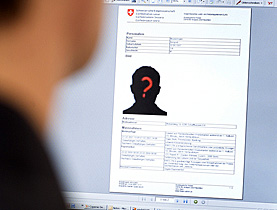Swiss worried about web privacy

A majority of Swiss find data protection on the internet important, but many are rather lax about revealing private information online, a survey has found.
The report, released just ahead of European Data Protection Day on Wednesday, also showed that people tended to trust public bodies with their personal data, but not private ones like telecom firms.
The survey of 1,006 people – the first of its kind in Switzerland – was carried out in January for the Swiss Association of Data Protection Commissioners.
In all, three quarters of respondents said that data protection on the web was either “important” or “very important”. Young people aged 15-34, the Facebook generation, were the most concerned of all the age groups (up to 74 years old).
But this concern doesn’t necessarily make people more cautious online, said the association, referring in particular to the amount of personal data revealed on community networking websites.
“People aren’t careful because they are not really aware of what happens to their data on the internet,” the association’s head Bruno Baeriswyl told swissinfo at the report’s unveiling in Zurich.
Trust and transparency
Trust was also deemed to be important. A large majority responded that they had faith in public institutions, such as the police and hospitals, over private data. But 44 per cent had misgivings about credit card companies, and more than half said they distrusted telecom firms.
“Public bodies follow and comply better with the current data protection legislation than the private sector, where we have legislation which is not enforced in the same way,” said Baeriswyl, who is also data protection commissioner for canton Zurich.
For Baeriswyl, the telecom companies “have to think over their services to see if they really guarantee privacy and if they really comply with data protection legislation”.
Particularly worrying for the association was the 15 per cent of those surveyed who said they had already suffered personal data abuse, such as for credit card fraud.
However, it was noted that until now Switzerland had been spared a large data-protection scandal, such as in Britain, where health records and information on prisoners have been lost in high profile cases.
Confusion
For Baeriswyl, the survey shows that the Swiss need more information about privacy issues. There is also some confusion about where to seek advice.
This is partly down to Switzerland’s federal system. The country has had a data protection law since 1993 and has a Federal Data Protection and Information Commissioner.
The country’s 26 cantons also have their own privacy laws and in most cases commissioners – represented by the Swiss Data Protection Commissioners Association.
“We are not subordinated to the federal data protection commissioner, and every canton has its own legislation, which means we have 27 data protection authorities, said Ursula Stucki, the commissioner for the canton of Basel Country and the association’s vice president.
“So it’s not always easy for people to know where to go.”
Overall the level of privacy protection in Switzerland – approved by most people in the survey – is around the same as in other European Union countries, according to the association.
Different attitudes
However, neighbouring countries’ attitudes towards data protection are a little different, noted Baeriswyl.
He pointed to a comparable EU barometer on privacy that showed EU citizens were much more concerned about the issue in general and were more likely to react if abuse was uncovered.
“The EU population has more information about privacy and the data protection commissioners are more present than they are in Switzerland,” he said.
Baeriswyl added that some cantons still did not have a commissioner to pass on key privacy information to the public and give advice.
“Our problem is making data protection really effective through the whole country,” he said.
swissinfo, Isobel Leybold-Johnson in Zurich
The Swiss Association of Data Protection Commissioners sponsored the survey, which was carried out from January 13-16 by telephone. The poll asked 1,006 people aged 15-74 years about their attitudes toward personal data security.
It was released to mark the third European Data Protection Day on January 28.
Organised by the Council of Europe, the day aims to increase awareness of data protection and privacy rights.
The Federal Act on Data Protection (FADP) came into force in Switzerland in 1993. The latest change was implemented on January 1, 2008.
Cantons also have their own laws. These are harmonised so that there are not huge discrepancies across the country, according to data protection commissioner Ursula Stucki.
She says European legislation on data protection is also applied under certain circumstances in Switzerland, which is not an EU member. In December Switzerland officially joined the Schengen area – which allows for closer cooperation with the EU on crime and justice matters. This includes access to a joint database that is subject to data protection rules.

In compliance with the JTI standards
More: SWI swissinfo.ch certified by the Journalism Trust Initiative




You can find an overview of ongoing debates with our journalists here. Please join us!
If you want to start a conversation about a topic raised in this article or want to report factual errors, email us at english@swissinfo.ch.